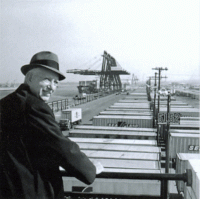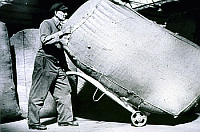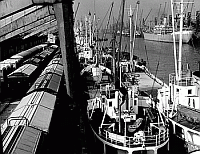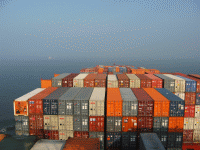 |
The man who invented the box is Malcom McLean, a farmer′s son from North Carolina. The story of his life is quite remarkable. He is one of the real examples from American history that shows how character and entrepreneurial spirit can propel whole societies into a new era. Taking brave steps during tough financial times, he first set out to build America′s second largest trucking company. Then with persistence and against all odds, he not only invented the container system but also made it work – globally and permanently. With his newly founded company "Sealand", Malcom McLean, the farmer′s son and former truck driver, conquered the world. Malcom McLean is rightfully called the father of containerization.
In the mid-1950s, Malcom McLean came up with the idea of taking the body from a tractor-trailer and placing it right on a ship, with all its contents untouched. Up until then, ocean shipping was back-breaking work – a tedious, expensive, and time-consuming task of unloading cargo from a truck carton by carton, loading it into the hold of a ship, and reversing the process at the ship′s destination – all done primarily by hand. A standard 20-foot-container, on the other hand, can carry many tons of goods. It can keep shipments together, protect them from the elements, from damage in handling, and from theft. It is not surprising, therefore, that today an estimated 90 percent of the world′s trade moves in containers. One hundred million containers crisscross the world′s oceans each year.
However, not everyone embraced the container revolution immediately. Traditional shipping companies did not give this idea a scintilla of a chance to survive. They thought it unfit for international shipping. Longshoremen who handled the cargo fought to keep their jobs which they perceived as threatened by the new technology. But the advantages of containerization were too powerful to resist. And the effects went far beyond the ports and the docks. In fact, many observers attribute the rise of trade between Western countries and Asia to the reductions in cost and shipping time made possible by containerization. Today, there is not a region in the world that is untouched by Malcom′s invention. This film, therefore, is a tribute to Malcom McLean, who is recognized as one of the most important innovators in the past 50 years.
One of the men whose work and life was dramatically influenced by Malcom McLean’s invention is the former dockworker and longshoreman Bodo Meyer. In 1966, he unloaded the very first shipping containers to arrive in Europe – in the seaport of Bremen, Germany. The standardized metal box – one of the 20th century’s major revolutions – had reached Europe and was on its way around the globe. Bodo Meyer′s story is closely intertwined with the arrival of the container. It is an example of the astounding impact the box quickly had on all people, in all regions of the world.
The container′s conquest is evident in many aspects: the container changed production methods worldwide, throughout all industries. It made goods and products available to consumers worldwide. It changed the appearance of cities and ports. Traditional professions have disappeared, ships have become unsightly and there is no time anymore for romance in seafaring. Shipyards have received record bulk orders, and new, far-away countries and regions have begun to boom. Container ports have sprung up everywhere, and some traditional ports have profited handsomely from their visionary flexibility and willingness to adjust to containerization. New markets have evolved. Products from all over the world can be bought and sold at very attractive prices. Thanks to the container box, the choice for the location of a production plant nowadays is arbitrary – all because goods transport is safe, reliable and extremely cheap. This list could go on. In short, however, without the box, globalization probably would still be pure theory.
"The world is just a container away."
|
 |








|
 |